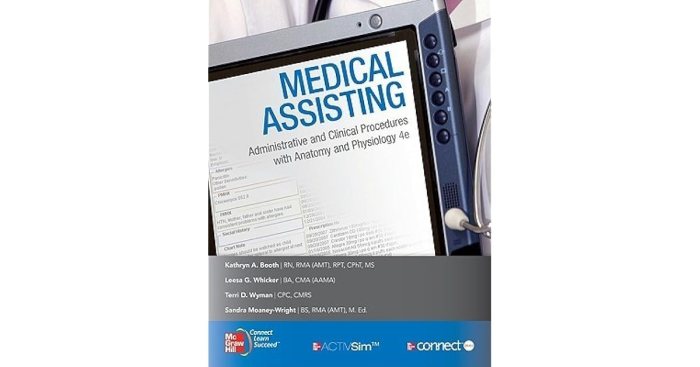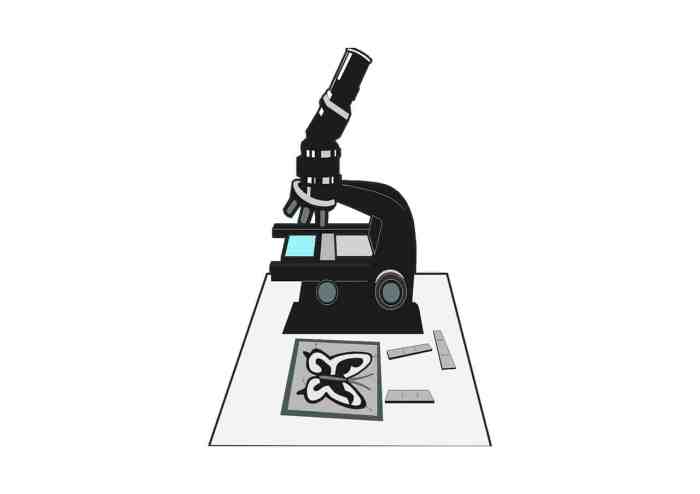Medical assisting: administrative and clinical procedures 7th edition – Embark on an in-depth exploration of Medical Assisting: Administrative and Clinical Procedures, 7th Edition, a comprehensive guide that delves into the intricacies of this multifaceted healthcare profession. This meticulously crafted text provides a thorough examination of the administrative and clinical responsibilities of medical assistants, empowering readers with the knowledge and skills essential for success in this dynamic field.
Throughout the chapters, readers will gain a deep understanding of the administrative tasks performed by medical assistants, including patient scheduling, insurance processing, and maintaining patient confidentiality. The book also delves into the clinical procedures performed by medical assistants, such as taking vital signs, assisting with examinations, and administering medications.
Emphasis is placed on the importance of proper infection control measures and the ethical and legal considerations that medical assistants must navigate.
Administrative Procedures
Medical assistants in an administrative setting play a vital role in the efficient functioning of healthcare facilities. Their responsibilities include:
- Scheduling appointments and managing patient records
- Processing insurance claims and billing patients
- Answering phones and providing information to patients and visitors
- Maintaining patient confidentiality and privacy
Maintaining patient confidentiality and privacy is of utmost importance for medical assistants. They must adhere to HIPAA regulations and ensure that patient information is protected from unauthorized access.
Clinical Procedures: Medical Assisting: Administrative And Clinical Procedures 7th Edition

Medical assistants perform a wide range of clinical procedures under the supervision of a physician. These procedures include:
- Taking vital signs (blood pressure, pulse, temperature, respiration)
- Drawing blood and administering injections
- Assisting with minor surgeries and procedures
- Preparing patients for examinations and procedures
- Monitoring patients after surgery or procedures
Proper infection control measures are essential in all clinical procedures. Medical assistants must follow established protocols to prevent the spread of infection and protect both patients and healthcare providers.
Some clinical procedures require special training or certification. For example, medical assistants who administer injections must be certified in phlebotomy.
Medical Terminology

Medical terminology is the specialized language used in healthcare. Medical assistants must be familiar with medical terms in order to communicate effectively with physicians, nurses, and other healthcare professionals.
Using correct medical terminology is important for accurate documentation and communication. For example, the term “myocardial infarction” is the correct medical term for a heart attack. Using the incorrect term “heart attack” could lead to confusion and errors in patient care.
Here are some examples of medical terms and their definitions:
- Bradycardia:Slow heart rate
- Hypertension:High blood pressure
- Leukemia:Cancer of the blood cells
Legal and Ethical Issues

Medical assistants may encounter various legal and ethical issues in their practice. These include:
- Obtaining informed consent from patients before performing procedures
- Protecting patient confidentiality and privacy
- Reporting suspected cases of abuse or neglect
Obtaining informed consent from patients is essential for ethical medical practice. Medical assistants must ensure that patients understand the risks and benefits of procedures before they give their consent.
Medical assistants may also face ethical dilemmas, such as when a patient requests a procedure that is not medically necessary. In such cases, medical assistants must consult with the physician and advocate for the patient’s best interests.
Communication and Interpersonal Skills
Effective communication is essential in medical assisting. Medical assistants must be able to communicate clearly and concisely with patients, physicians, and other healthcare professionals.
Different types of communication used by medical assistants include:
- Verbal communication (speaking and listening)
- Nonverbal communication (body language, facial expressions)
- Written communication (charting, reports)
Building rapport with patients and colleagues is also important for medical assistants. This can be achieved by being friendly, respectful, and empathetic.
Technology in Medical Assisting
Technology plays a significant role in modern medical assisting. Medical assistants use a variety of technology to improve patient care, including:
- Electronic health records (EHRs)
- Telemedicine
- Medical imaging equipment
EHRs allow medical assistants to access and update patient information electronically, which can improve efficiency and accuracy.
Telemedicine allows medical assistants to provide care to patients remotely, which can be especially beneficial for patients in rural or underserved areas.
Medical imaging equipment, such as X-rays and ultrasound machines, helps medical assistants diagnose and treat patients more effectively.
Question & Answer Hub
What are the primary roles and responsibilities of a medical assistant?
Medical assistants perform a wide range of administrative and clinical tasks, including scheduling appointments, processing insurance claims, taking vital signs, assisting with examinations, and administering medications.
What is the importance of maintaining patient confidentiality and privacy?
Patient confidentiality and privacy are paramount in healthcare. Medical assistants are responsible for protecting patient information, both verbally and in writing, and adhering to all applicable laws and regulations.
What are some examples of clinical procedures that require special training or certification?
Some clinical procedures, such as phlebotomy, electrocardiography, and medication administration, require specialized training and certification. Medical assistants must complete the necessary training and obtain the appropriate certifications before performing these procedures.